Growing up with a toxic parent can have far-reaching consequences on a child’s psyche, even after turning into an adult.
When your childhood is enmeshed by a toxic parent and you fail to realize it.
Most parents genuinely do their best to provide their children with a healthy upbringing but oftentimes these very individuals may make mistakes. Parenting is a tricky job and it’s mostly based on intuition and instincts.
Unfortunately, some parents go beyond the occasional mistake and veer into the toxic category.
Regardless of whether or not a parent is purposefully being toxic, there are a number of behaviors on the parents’ part that leave a considerable psychological and emotional scar on the child. This invariably hampers the overall mental health of the child as he/she steps into adulthood.
If you experienced any of the following situations as a child, the odds are high that one or both of your parents were at least slightly toxic.
Related: 20 Signs You Are The Child Of a Toxic Parent
13 Signs You Grew Up With Toxic Parent
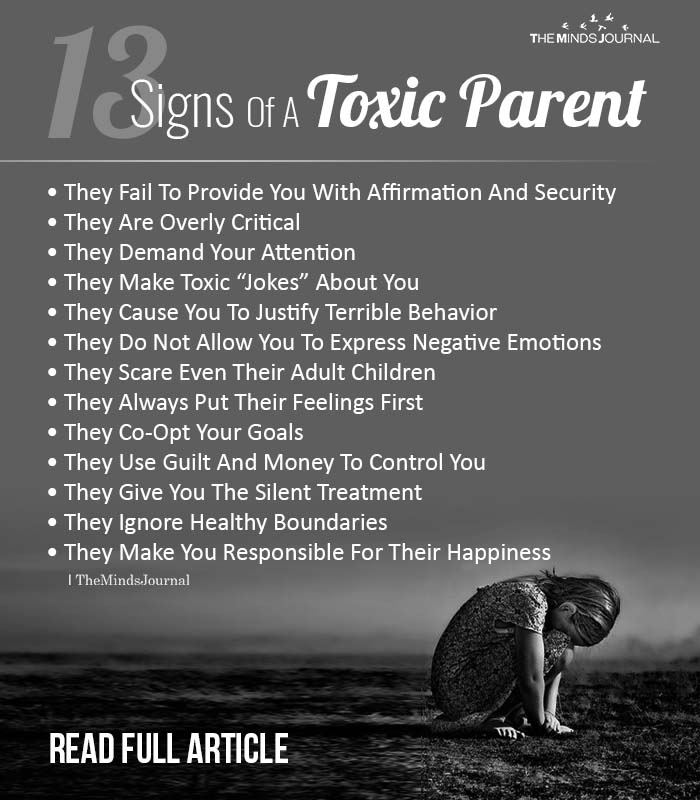
1. They Fail To Provide You With Affirmation And Security.
Some people believe that showering careless love is an important way to ensure that their children become self-reliant and are able to take care of themselves in the future.
If you were the recipient of this approach of parenting on a regular basis, you might have been tricked to believe that this was the behavior you deserved or the treatment meant for your betterment.
If you apparently fall apart now because of any perceived failure or rejection, then this most likely stems from a parent’s toxic inability to provide you with the necessary amount of security, contentment, and affirmation while you were young.
Tough love might work sometimes, but it cannot be the only approach a parent takes if they want their child to have an overall wholesome future.
2. They Are Overly Critical.
Parents should occasionally involve in appraising their children with feedback about their actions.
Without this component, we might never learn how to do numerous things in the correct way, such as everyday chores like washing laundry, cooking food for ourselves, ironing clothes, organizing our personal stuff, etc.
A toxic parent takes this to extremes by being overly critical about everything their child does. Even trivial mistakes on the part of the children will bring about grim consequences.
These criticisms can have distinct faces – some through poisonous verbal abuse in the form of insults, explicit, harsh facial expressions,s and neglectful body language.
This technique will only backfire for some children will eventually commit graver mistakes and some children will end up feeling miserable about themselves, slipping into self-loathing.
Parents can make the mistake of believing that they do this to make sure their children avoid making costly mistakes.
Unfortunately, what this behavior really does is cause the child to develop a detrimental inner conflict that can be borderline crippling during adulthood.
Related: 20 Clear Signs You Are The Child Of Toxic Parents
Toxic parents often turn their children into their own parental substitutes and dumping grounds for their own frustrations by demanding their attention at all times.
This can be seen as a bonding between the parent and child, but in actuality, it is a parasitic relationship that requires too much of the child’s time and energy when they should be focused on learning other skills.
Although it may be difficult at times, pragmatic parents will allow their children enough space to grow without demanding constant interactions from them to suit their own needs.
4. They Make Toxic “Jokes” About You.
All parents occasionally pick on their children, but when the so-called jokes become nasty satire meant to insult or demean their children, this can be a huge problem.
You do not need to accept this type of behavior just because your parent has always joked about something such as your height or weight.
Ultimately, this is an undermining tactic that will make you feel small about yourself. If a parent has a legitimate concern to address with their child, they should be honest and non-critical as opposed to being sarcastic.
5. They Cause You To Justify Terrible Behavior.
Did you grow up believing that your parent was physically or emotionally abusive to you because you deserved it?
If yes, then you still must be justifying awful behavior from others at your own cost.
Toxic parents can twist every situation, and facts to their advantage and this leaves children with two choices: accept that their parent is wrong or feel powerless and internalize all of the blame.
In most cases, children, even those who are adults now, choose the latter option. They believe that some characteristics or actions on their part must have instigated their parents to become so enraged.
This mindset only hampers their self-image and their developing self-esteem. They assume that they are worth the worst of behavior from their parents.
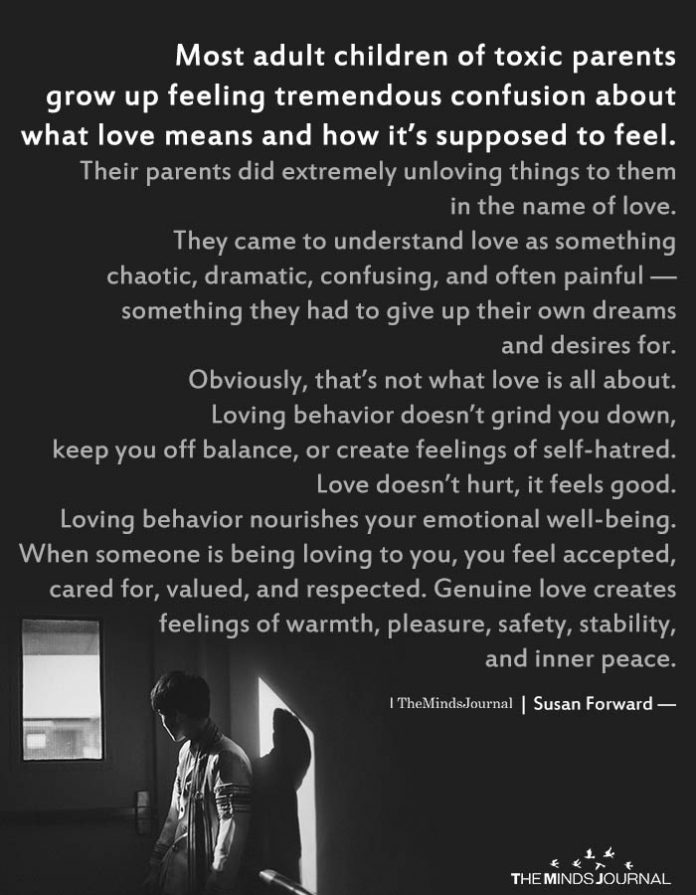
6. They Do Not Allow You To Express Negative Emotions.
Parents who fail to nurture their child’s emotional needs and make light of their negative emotions are setting up a future where the child will never be able to be assertive about their needs.
There is nothing wrong with helping your children focus on the positive aspect of a situation. However, being completely indifferent to a child’s negative feelings and emotional needs can lead them to suppress these valid emotional expressions, only to get them out in distorted ways.
This will only create an adult who is not adept at emotional regulation and handling negativity in their life.
Related: 5 Signs You Should Break Up With Your Toxic Parents For Good
7. They Scare Even Their Adult Children.
Respect needs to be earned. Fear cannot buy respect. In fact, children who feel loved, supported, and connected are much more likely to be happy as adults.
Although implementing discipline of some sort is necessary, toxic parents use highly violent actions and words that are permanently damaging to the human psyche. Sometimes this scars the child forever and inserts fear in the child.
Children need not be afraid of their parents to be respectful of them. Every time their parents call them, they don’t need to be perspiring in fear of being thrashed.
8. They Always Put Their Feelings First.
Parents should not feel like they are the ultimate power exercisers of the family and only their needs, and feelings should be prioritized.
But this antiquated way of thinking is not going to foster positive relationships between parents and their children.
Even though parents do need to make the final decision about everything from dinner to vacation plans, it is necessary to be considerate of the feelings of every family member — including the children. The children’s opinions, ideas, and values are no less respectable than the parents’.
Toxic parents on the other hand will constantly force children to suppress their own feelings in order to appease their parents.
9. They Co-Opt Your Goals.
Did one of your parents become interested in everything you were doing to the point where they took over or even duplicated you?
This can seem like the actions of someone who is genuinely interested in their child’s life. But what it often does is make it harder for the child to actually meet their goals.
For example, if you have to sell 50 boxes of cookies at the same time that your mother decides to make cookies and pass them out to the neighbors, it is going to be a lot harder to hit your sales goal.
This behavior can derail you throughout your entire life if you allow your parent to keep getting away with it.
Related: 10 Things Toxic Parents Say And What They Actually Mean
10. They Use Guilt And Money To Control You.
Every child has experienced a guilt trip from their parents at one point or the other, especially during arguments. But toxic individuals resort to this tactic on a regular basis.
Even as an adult, your parent might still be controlling you by providing for you in ways that might not be easy for you to return. If you fail to do as they expect, they will then try to make you feel guilty about it because of “everything they have done for you”.
Healthy parents know that children do not owe them a specific response in exchange for money or gifts, especially when these items were not demanded in the first place.
11. They Give You The Silent Treatment.
It might be difficult to communicate when one is frustrated and angry but shutting out a child with the silent treatment is very damaging and immature.
Dishing out this passive-aggressive treatment hampers any type of relationship. It makes the recipient feel pressured into fixing the situation, even when they didn’t do anything wrong.
If a parent is too mad to have a rational conversation, they should excuse themselves before they are ready for a straightforward conversation to clear the matter.
Toxic parents will never engage in mutual interactions backed by good listening skills and understanding.
12. They Ignore Healthy Boundaries.
In certain situations, it may even be necessary for parents to do a bit of snooping to keep them protected. However, everyone needs to be able to set clear, healthy boundaries for themselves, especially teenagers.
Parents who are toxic, override these boundaries at every juncture, and not only lose the trust of their children but also strain the positive relationship between themselves.
For example, a toxic parent will open their child’s door without knocking first and will use their children’s personal stuff without their knowledge. Parents definitely have the right to enmesh their children but never to the extent of creating a toxic connection with them.
This sets up a pattern that makes it hard for their children to properly recognize and understand boundaries later in life.
Related: 8 Things Parents Do That Keep Children From Succeeding
13. They Make You Responsible For Their Happiness.
This is one of the worst traits of a toxic parent.
If one of your parents directly or indirectly holds you responsible for the unhappiness and struggle in his/her life, then he/she is placing unrealistic expectations on your role in their life.
No child should be held accountable for their parent’s happiness.
Also, parents should never expect their children to give up on their dreams and goals just to make them content. Being forced into this situation will make it difficult for adult children to understand that we are all responsible for our own happiness.
Cutting away connections with toxic people from your life may seem impossible, especially if one of them is a parent. But dealing with a toxic parent is important if you want to be happy in life.
Unless you actively look into the matter, it will be much harder to undo the emotional and mental damage already inflicted on the child by a toxic parent.
On the plus side, any toxic parent who recognizes themselves within the 13 points in this article can turn to a trained counselor for assistance with breaking their negative behavioral patterns.
If you want to know more about the signs of a toxic parent, then check this video out below:

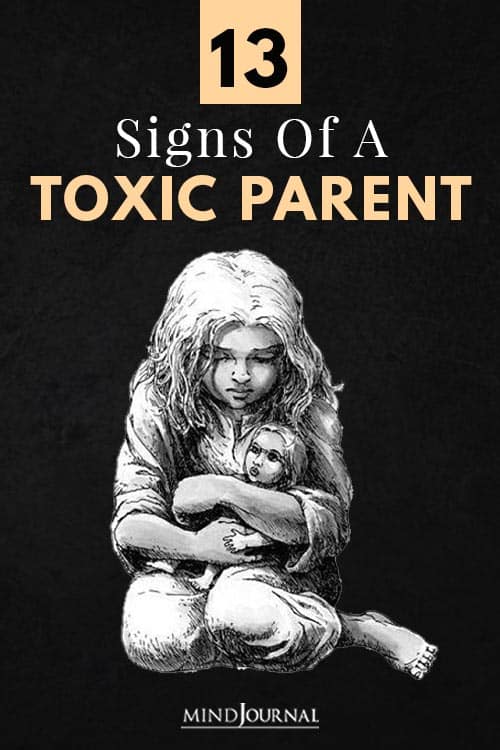
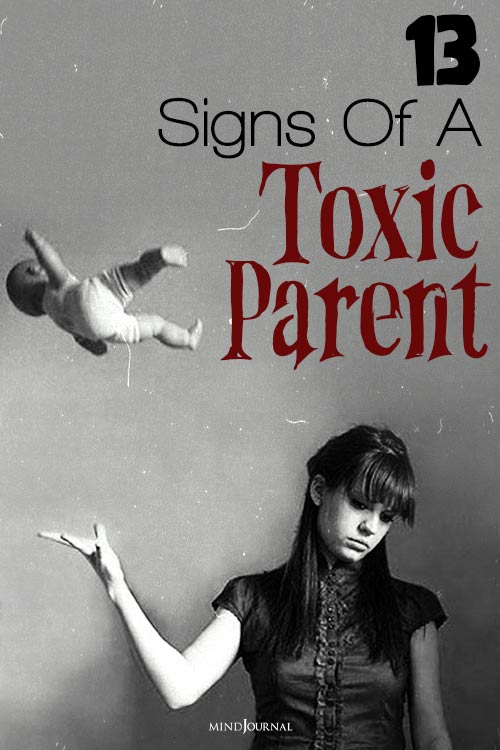
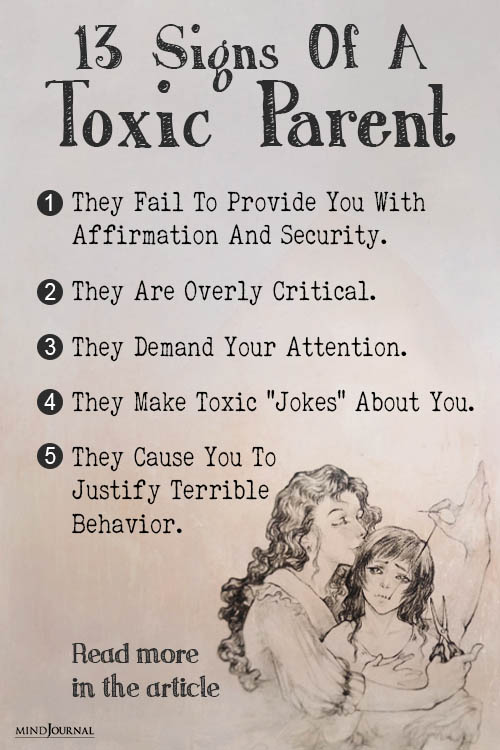

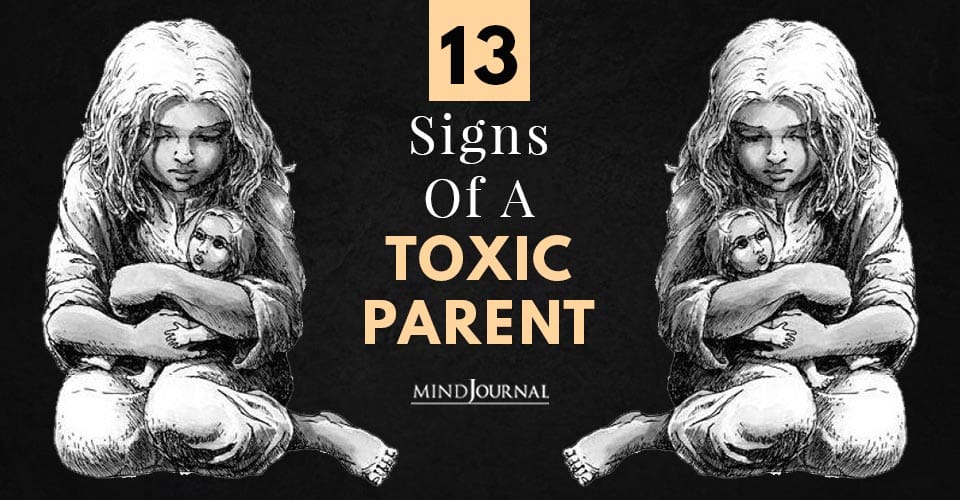







Leave a Reply